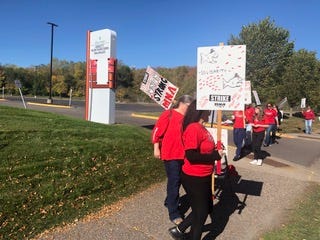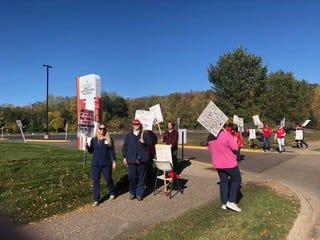Making moves on the bosses
Nurses at Allina WestHealth end their three-day strike. Workers at Half Price Books marched on the boss, asking for recognition for their union with UFCW. Also, how IATSE members mobilized.
Greetings! It’s Amie again, back from my mountain trip. I did not get eaten by a bear, but I did wake up in a panic at 2am because a mouse crawled down my leg before disappearing into the night. 🐁 🚫
Anyways, mice aren’t the only things making moves! What an exciting time for the labor movement. Strikes are making it onto national and mainstream news, and we are finally hearing the voices of workers during the pandemic at the center of stories. The narrative changed from “no one wants to work and it’s interrupting our way of life!” to “this is why workers are fed up and striking!” It only took 19 months. 🙄
For some reporting that centers workers, Filiberto Nolasco Gomez (@Hauteques) has more details on the nurses’ strike this week, and check out more news below.
Nurses strike for fair pay and benefits at Plymouth’s Allina WestHealth
Very few workers have been more deeply and irreparably impacted than nursing.
After working through a pandemic, the striking nurses of Allina WestHealth in Plymouth are surprised by the Allina’s unwillingness to consider holiday pay. The strike Sunday the 17th and ended early on the morning of Wednesday, October 20, 2021.
According to the nurses union Minnesota Nurses Association (MNA) (@mnnurses):
“MNA nurses have been negotiating a new contract for months, but Allina has refused to agree to fair pay for holiday work or adequate benefits. Compensating nurses fairly for holiday work is especially critical because understaffing by Allina and other hospital systems has required nurses to work more days and longer hours, including overtime and holidays, as they continue on the frontlines of the COVID-19 pandemic.”
Sonya Worner, a Registered Nurse at WestHealth, has chosen to stay working at the hospital despite the challenges faced every day. She sees her role as a way to build and commit to the local community.
“We have a tremendous amount of support, clearly nurses want to provide patient care. We do not want to be out here. This is not enjoyable. This is not what we had in mind, but we need to get a contract that is settled.”
Keeping nurses like Sonya is ever more important as many nurses have left WestHealth due to burnout or for more pay.
Allina seems indifferent to losing qualified experienced nurses. The union contends that an improved contract with more competitive benefits and pay protects patients, and experienced nurses would have a reason to stay. According to the union:
“A fair contract that provides adequate benefits and holiday pay will not only justly compensate the nurses currently working, but it is also essential to attract and retain new talent in the profession. While there is no shortage of nurses who want to work at the bedside, there is a shortage of nurses willing to work under current hospital conditions.”
In an email response Allina stated that:
Allina Health and Abbott Northwestern WestHealth have negotiated 7 times with MNA. A contract settlement was previously reached and unanimously recommended by the union’s bargaining team. Unfortunately, the MNA could not finalize that agreement. Throughout negotiations, we have consistently offered proposals that demonstrate our commitment to our employees, including an immediate wage increase to align wages with other metro hospitals and agreeing to some of the union’s other priority issues.
Featured on Workday, a piece on the action at Half Price Books locations in St. Paul and Roseville by Michael Moore at St. Paul’s Union Advocate (@unionadvocate):
For many Half Price Books workers, the pandemic brought into focus both how little regard the company has for their concerns and how unsustainable their jobs have become, said Aaron Kerr, who has 24 years of experience working in Half Price Books stores.
“For years prior, we were really kind of just putting up with it, just accepting this as the way things are,” Kerr said. “And we would see so much turnover. People were saying, ‘I love this job, but I can’t afford to work here.’
Read more here.
Also featured on Workday, Mike Elk (@MikeElk) from Payday Report on how IATSE members were mobilized during the pandemic:
This past March, Tom Pieczkolon was reading about Amazon’s failed union drive in Alabama when a light went off in his head.
The 30-year-old sound engineer, a member of IATSE Local 695, suddenly realized his struggle to gain better working conditions for those in the film industry was connected to Amazon’s warehouse workers as Amazon was a major employer of film production workers.
“A lot of us are really fighting against the same conglomerates,” said Pieczkolon of the defeat. “We saw the Amazon union drive when unions tried to unionize in Alabama earlier this year. It was very disheartening to see how much money and effort Amazon as a company put into making sure that the union didn’t come through.”
However, Pieczkolon says that the 60,000 film industry workers, backed with high-profile celebrity support, have the chance to inspire other workers to continue to strike.
MN’s Frontline Worker Pay Working Group stalemate persists
Yesterday, the legislators in charge of figuring out how to get frontline workers their pandemic bonus pay met after missing their deadline six weeks ago. They didn’t reach a compromise. Republican members want to hand the two proposals over to the legislature instead of coming to an agreement on one, but since the legislature is not in session, the DFL members are reluctant to give up working on a united proposal.
Some highlights from their debate over risk and eligibility...
Senator Karin Housley: “There are essential workers that the governor deemed essential. We are tasked with frontline workers. There’s a difference between essential and frontline...between a clerk and a nurse who is holding a dying man while he’s breathing covid germs on her. Those people knowingly took a risk and still went to work every single day. Ask your neighbors…who was truly frontline? And if you expand that pool, you’re taking money away from those who are still double masking...now we’re in the fourth wave of covid. My friend just died two days ago in the hospital from covid…do we water it down? This is supposed to be a thank you.”
Representative Ryan Winkler: “I can’t let that pass without noting all of the people…who don’t fit your definition and who underwent tremendous risk and sacrifice to allow all of us to survive this pandemic and to allow all those workers who you are listing to be able to do their jobs. Those workers, nurses and long term care workers, many of them have said to us in this room, don't leave anybody out.”
Sen. Housley: “Tremendous sacrifices doesn’t mean equal sacrifices...”
Senator Erin Murphy: “Whether you were in a hospital or meatpacking plant or a grocery store, you were encountering the virus...who do we declare a hero? They’re all frontline workers, they all faced the virus that continues circulating through our communities. As a nurse, I can’t square the science nor the value suggesting that there are some that faced more risk because it just isn’t true. The risk was for all of them.”
They’ll be meeting again next week, hopefully ready to compromise.
What do you think? Is there even a difference between “essential” and “frontline”?
What we’re reading
Are you following the #NetflixWalkout? Zoe Schiffer (@ZoeSchiffer) from The Verge reported on Netflix’s firing of the Black trans employee who organized the walkout yesterday in protest of Dave Chappelle’s comedy special.
Eoin Higgins (@EoinHiggins_) reports on flight attendants voting to authorize a strike.
Sarah N. Lynch (@SarahNLynch) from Reuters on Facebook news: $14.25 million to settle U.S. employment discrimination claims.
If you live in Minnesota and are part of the labor movement or want to be more involved, click here to answer some questions!
Share this post with your network to update them on what’s up with the workers.

Remember to hydrate and rest. We are each other’s harvest.








